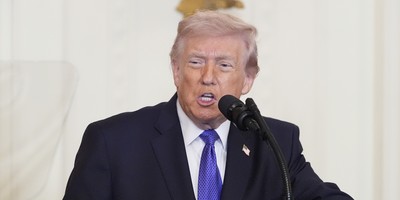On Tuesday, Oct. 26, 2009, congressman Barney Frank (D-Mass.) appeared opposite Ralph Nader on "The Ed Schultz Show." When Nader questioned Frank's far-left bona fides, Frank quickly responded, "we are trying on every front to increase the role of government."
This is what today's liberal movement has become. Stripped to its essentials, modern liberalism is now a nakedly ambitious power grab by corrupt officials, their union allies and faux-victimized purloiners of the taxpayer till. Its underlying premises -- the ultimate goodness of government, the ultimate evil of the American population -- are plainly inconsistent with the foundations of constitutional philosophy.
It was not always thus. Over the weekend, I had a chance to re-read one of my favorite authors, John Steinbeck. Steinbeck was considered for decades the leading authorial spokesman for the blue collar left. "The Grapes of Wrath," his most famous work, is undoubtedly a liberal tract -- it condemns the harshness of unbridled capitalism and asks (literally) for the milk of human kindness.

Whereas today's liberal spokespeople have been infected by a virulent anti-Americanism that sees all businessmen as profiteers and all public workers as saints, Steinbeck was a patriot. He worried about the lack of kindness he saw in his fellow men, particularly the willingness to cut corners to make a buck -- but at the same time, he saw the virtue of freedom.
In 1960, Steinbeck wrote a piece in Newsday magazine in which he explained his view of morality. "[It's] very clear that peoples are strong when they are moral in the sense that the good of the group or the nation takes precedence over the selfish good of the individual. And we know from many examples of the past that when this is reversed and the individual raids the public good for his own purposes, the laws of decay have set in." In short, a nation comprised of a group of individuals governed by a common morality is stronger than an agglomeration of atomistic individuals acting solely for their own benefit.
Recommended
Steinbeck's brand of liberalism made political debate a real possibility. After all, conservatives agree that men are neither angels nor devils, and that not everyone will behave with the same honor as an Ayn Rand-ian hero. Steinbeck's solution to the problem of "immorality" was not necessarily more government, but better men in government, and not necessarily more regulation, but more self-regulation. Communal standards were important, but there was no guarantee that government would be the best judge of communal standards. As Steinbeck wrote shortly before his death, "It is our national conviction that politics is a dirty, tricky and dishonest pursuit and that all politicians are crooks. The reason for this attitude is fairly obvious -- we have had cynical and dishonest officials on all levels of our government."
Steinbeck was embraced by the 1930s New Deal liberals because he wrongly saw FDR's collectivist efforts as a corrective to the moral problem posed by supposed individual exploitation of the system. But Steinbeck's brand of liberalism was rejected wholesale by the left in the 1960s. Suggestions that Americans embrace traditional morality were no longer enough for the left -- a broader transformation of American values was necessary.
Critics labeled Steinbeck a relic of the past, his morality was too old-fashioned. Time magazine said that he had entered "late-middle-aged petulance." Detractors on his left claimed that he was too wedded to capitalism, that he was archaically clinging to nationalistic feelings regarding the military (especially after his reports from Vietnam, which accurately described the Viet Cong as barbaric), and that he was not sufficiently utopian.
And so Steinbeck's philosophy was jettisoned. The American people no longer had the potential for good -- now they were all rapacious individuals dedicated to plundering their fellows. Government was no longer susceptible to corruption; it was now the ultimate arbiter of right and wrong, and the best embodiment of the collective. Liberalism, which was once a philosophy of doubt -- doubt about both the individual and the government -- became a philosophy of certainty.
Modern liberalism is now impoverished by its own simplicity. Government is always the solution, and individualism is always the problem. As President Obama so succinctly put it in 2008, "our individual salvation depends on collective salvation." Steinbeck's liberalism put it differently: "It believe that man is a double thing -- a group animal and at the same time an individual. And it occurs to me that he cannot successfully be the second until he has fulfilled the first." The founders would have agreed with Steinbeck. Today's liberals agree with Frank and Obama. The day authentic liberalism died, so did the possibility of bridging the gap between modern liberalism and the founding principles of our country.

























Join the conversation as a VIP Member